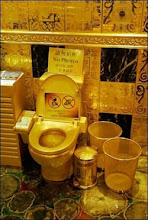
The Golden Latrine still remembers the time he played Grand Theft Auto III solidly for a weekend at university. Finally stepping outside, sun-starved and bow-legged, the real world and the computer game world seemed to have merged.
It appears that the Golden Latrine is not alone though - ITV know exactly how that feels. In the most po-mo development in human history, it emerged that some footage from an ITV documentary of "terrorists" using Libyan weapons to shoot down a plane was, in fact, lifted directly from the video game ArmA II.
Now, anyone with half a brain (or anyone who watched any of Charlie Brooker's Newswipe) knows that the news is a simplified, abbreviated, selectively-edited construction, and not a perfect mirror of current affairs. The joy of documentaries is that they can put some flesh on the basic facts.
But once you know that one piece of the documentary is falsified, it's not a great leap to then ask yourself what else has made its way in there? Consider the case of the recently shamed Independent columnist Johann Hari: once his shall we say "liberal" attitude towards quotation and maliciious Wikipedia editing became public, it cast a shadow of doubt over his entire body of work. I recently re-read his beautifully-written piece on Dubai, and found myself wondering if any of it was real. Knowing what we do now, it just rang false.
ITV's official statement blamed an editing room mix-up for the inclusion of the computer game footage. As they put it:
The events featured in Exposure: Gaddafi and the IRA were genuine but it would appear that during the editing process the correct clip of the 1988 incident was not selected and other footage was mistakenly included in the film by producers. This was an unfortunate case of human error for which we apologise.Now I don't know about you, but to me that rings some fairly shrill alarm bells. If it truly was, as ITV claimed, "human error", then they're guilty of rank amateurism (and precisely how did the ArmA II footage end up there?). And if it was inserted intentionally then...well, those of us in what a George Bush aide once called "the reality community" might as well hang up our coats and surrender. How did they think no-one would notice?
That said, perhaps the "human error" alibi isn't as ridiculous as it sounds. In his wonderful critique of the news industry, Flat Earth News, Nick Davies tells of trainees at ITV's newsrooms left to cut pictures and write underlays (the words to be spoken over the pictures) despite having no experience of either. As Davies reports of one such trainee:
She said she had cut pictures too short for their slot with the result that the screen went to black for several seconds, as well as writing underlays that were too long for their pictures so the item ended in mid-sentence.
The perfect metaphor
However the game footage made it into the IRA documentary, it nevertheless seems the perfect metaphor for our times. In 1991, French philosopher Jean Baudrillard published three essays before, during and after the first Gulf War: "The Gulf War will not take place", "The Gulf War is not really taking place" and "The Gulf War did not take place". Baudrillard's thesis was not that the conflicts had not physically taken place, but that the way both the soldiers and viewers at home experienced these conflicts had changed massively. The "war" was conducted like a computer game, a remote-controlled war, with a minimum of casualities on the American side. The daily news showed on-board recordings of the bombers hitting their targets.
Back to the IRA documentary though, and Marek Spanel, chief executive of the game's developer Bohemia Interactive Studio, professed himself bewildered but told Spong he took it as a compliment of sorts, calling it "a bizarre appreciation of the level of realism incorporated into our games." And in a perverse way, he's right.
Computer games are becoming graphically ever-more lifelike, and incorporating an increasingly cinematic level of narrative (take something like L.A. Noire), but let's not start using them as a substitute for reality in weighy documentaries just yet. Thanks ITV.
Edit: The Guardian's Ben Goldacre posted a link on Twitter to this brilliant spoof of the story discussed in this blog. Recommended viewing!


No comments:
Post a Comment